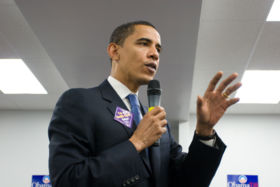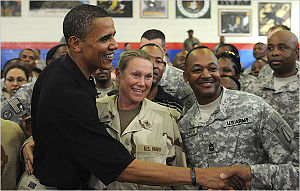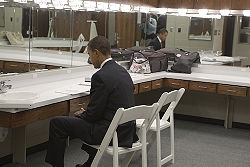Barack Obama presidential campaign, 2008
In February 2007, Barack Obama announced at the Old State Capitol building in Springfield, Illinois, that he was a candidate for U.S. President.
Obama presented himself as a post-racial, post-partisan contender of universal appeal, promising to end the old politics and bring the country together in bipartisan fashion. He appealed strongly to youth and stresses his early opposition to the war in Iraq. Making "change" his central campaign theme and downplaying race, Obama, a charismatic speaker, argues "We can't afford to settle for the same old politics." In late 2007 he repeatedly attacked Clinton for her 2002 vote supporting war against Iraq, and for her ties to lobbies and old-fashioned politics.[1] Clinton responded by hammering away at Obama's inexperience and charged he substituted rhetoric for action. Bill Clinton, noting that Obama and his wife recorded similar voting records in the Senate, snapped that Obama was engaging in a "fairy tale" regarding Iraq, a point of ridicule that bothered Black leaders and increased racial polarization among Democrats.[2]
Obama raised $103 million in 2007 and spent $85 million, and raised a record setting $32 million in January 2008. In terms of his Senate voting, he moved 15 places to the left in 2007, ranking as the most-liberal member of the U.S. Senate. In 2006, he had been the 16th-most-liberal senator.[3] Obama's popularity is strongest among younger and better educated voters. He dominated African American support, which comprises about 20% of the Democratic primary vote nationwide, and 30-50% in the deep South, notably as South Carolina, Mississippi, Alabama and Georgia. However Clinton's husband Bill Clinton has long been popular in the black community and she received many high profile endorsements.
2008 began with Clinton enjoying a big lead nationally, but Obama scored a stunning victory on January 3, in the Iowa caucuses, defeating Clinton and John Edwards by 8 points. [4] With Obama seizing the momentum and attracting youthful voters, pundits and pollsters agreed he was heading to a landslide win in the New Hampshire, the first primary state. But Clinton surprised everyone (even her own staff) by winning the primary 39% to 37% for Obama and 17% for Edwards. Obama did best among men, younger voters, independents, and college graduates, while Clinton won by wide margins among women, poorer voters, union members, registered Democrats and older voters--that is, her voter profile resembled the historic New Deal Coalition.[5] Clinton again outpolled Obama in the Nevada caucuses, but Obama refused to concede because he claimed one more delegate than she. With John Edwards trailing far behind, the Democratic contest focused on Obama and Clinton. In a bruising battle in South Carolina on Jan. 26, Obama, with strong black support, won decisively. Clinton remains ahead in nationwide polls and in most states on Tsunami Tuesday. The campaign turned rough in mid-January, as Obama began to link the two Clintons:
- "He [Bill Clinton] continues to make statements that are not supported by the facts — whether it's about my record of opposition to the war in Iraq or our approach to organizing in Las Vegas. This has become a habit, and one of the things that we're gonna have to do is to directly confront Bill Clinton when he's making statements that are not factually accurate."[6]
Obama won a landslide in the South Carolina primary by sweeping 78% of the the blacks vote and 25% of the whites, giving him 55% overall to 27% for Clinton and 18% for Edwards. Analysts point out that the upshot may be that Obama is typecast as the "black candidate" with a weak appeal to Hispanics as the contest heads to states where blacks comprise less than 25% of the primary voters. As political scientist Larry Sabato noted, "A few carefully chosen words and framing angles [by the Clintons] have transformed Obama from the post-racial, post-partisan contender of universal appeal into a more typical African-American candidate, who is much less intrinsically attractive to whites and Hispanics." On Tsunami Tuesday the outcome was a virtual tie in terms of votes and delegates. [7]
After Tsunami Tuesday, Obama won 11 straight contests, carrying major states like Virginia, Maryland and Wisconsin by landslides, and reducing Clinton's once formidable coalition to a narrow lead among white women and Latinos. She rebuilt her coalition in Texas, Ohio and Pennsylvania, equalizing the race in early March. Meanwhile Obama was embarrassed when a top foreign policy advisor resigned after calling Clinton a monster, when attention focused on an Obama business partner and fundraiser on trial in Chicago on criminal charges, and the diplomatic episode in which Obama's top economic advisor told Canadian officials that Obama's attacks on the NAFTA trade agreement represented campaign rhetoric.
Even sharper attacks were directed at the Rev. Jeremiah A. Wright Jr. of Chicago, who was Obama's minister and spiritual advisor for 20 years. Obama opponents circulated videos of Wright's hardline attacks, including the statement "God damn America for treating our citizens as less than human," in reference to U.S. race relations. Obama in mid-March disavowed Wright, but his long-time association with Wright proved a major campaign issue for Clinton. Polls in March showed him significantly damaged by the Wright connection, losing support among the independents who formed a critical part of his base. Republican strategists predicted that Wright's angry sermons, in which the minister blame American foreign policy for the 9/11 attack and criticized Israel, could represent a powerful weapon against Obama in the fall. In a major speech on March 18 Obama repudiated Wright but attributed his anger to lingering racism in America; Obama conceded that he knew Wright "to be an occasionally fierce critic of American domestic and foreign policy" and that he had heard controversial remarks in church. Wright himself went on national television to repeat his rhetoric and criticize Obama, forcing Obama to decisively repudiate Wright. In late May another preacher at the same church ridiculed Clinton to a cheering congregation, and Obama officially resigned from the church. About half of North Carolina Democrats said the Wright issue mattered to them, and they voted decisively for Senator Clinton. After the Wright affair McCain pulled slightly ahead of Obama among unaffiliated voters. McCain enjoyed unified support from Republican voters while Obama only attracted 65% of Democratic votes at that time.[8] At a deeper level, Obama had trouble reaching white working class Democrats, who voted heavily against him in April and May primaries, and who told pollsters they may vote for McCain in the fall or just stay home.
Global financial crisis
During the 2008 financial crisis, Obama and McCain clashed over the proposed taxpayer-baked Wall Street bailout; while McCain said he would suspend his campaign to go to Washington for talks over the deal, Obama argued that the forthcoming presidential debate should continue. In the event, Obama did go to Washington, but according to some commentators, was the more effective of the two men in raising pertinent issues. Obama later said that reflection rather than drama was his position during the crisis.[9]
Footnotes
- ↑ "Senator Obama's victory speech [in Iowa] was a concise oratorical gem. No candidate in either party can move an audience like he can.... He's...charismatic." Bob Herbert, "The Obama Phenomenon," The New York Times, Jan. 5, 2008; Obama Dec 27. 2007 speech at Obama official website; Jonathan Greenberger, ABC News, May 17, 2007 report
- ↑ Kristin Jensen and Julianna Goldman, "Clinton, Obama Battle Makes for Partisan Politics Without Unity," Bloomberg News, Jan. 10, 2008
- ↑ Brian Friel, Richard E. Cohen and Kirk Victor, "Obama: Most Liberal Senator In 2007" National Journal, Jan. 31, 2008
- ↑ http://www.timesonline.co.uk/tol/news/world/us_and_americas/us_elections/article3134308.ece
- ↑ See NBC report at [1], and CNN report at [2]
- ↑ Carrie Budoff Brown, "Obama faces off against both Clintons," POLITICO Jan 20, 2008
- ↑ Mark Z. Barabak, "Obama easily wins heated S.C. primary," Los Angeles Times Jan. 27, 2008; Larry Sabato, Sabato's Crystal Ball - Vol. VI#3 Jan 24, 2008.
- ↑ Tim Reid, "Polls show Barack Obama damaged by link to Reverend Jeremiah Wright," (London) Times Online Mar. 21, 2008; Rasmussen reports, "The Impact of Pastor Wright and THE SPEECH on Election 2008," March 20, 2008
- ↑ TIME: 'Why Barack Obama is winning.' November 3 2008.


